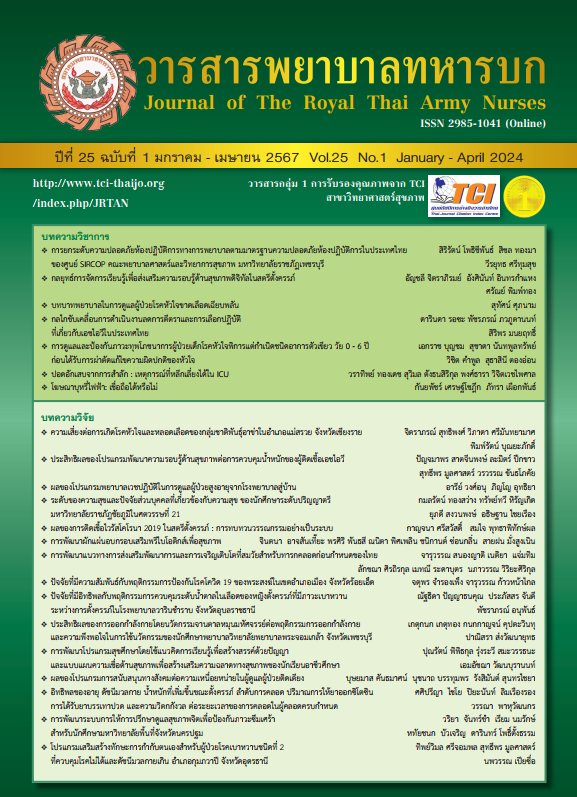The Implementation Mechanism to Reduce HIV-Related Stigma and Discrimination in Thailand (Crisis Response System: CRS)
Keywords:
Stigma, Discrimination, HIVAbstract
Thailand has expressed its determination to end the AIDS problem (Ending AIDS) by 2030 with the goal of reducing discrimination due to HIV and gender. It has set a clear goal of eliminating social barriers. and laws to reduce access to services by no more than 10 percent.
The Crisis Response System (CRS) developing a system for receiving complaints and protecting rights violations regarding AIDS, gender, and being a population vulnerable to discrimination (Crisis Response System: CRS) or a program CRS is a channel for receiving complaints about AIDS rights violations through an online web application.
The Crisis Response System (CRS) uses technology to provide services that are easily accessible and allow people to report incidents themselves. and will receive systematic, timely and efficient assistance Mechanisms driving action to reduce HIV-related stigma and discrimination in Thailand There is development of the potential of multidisciplinary teams at every level, every organization, and covering every province (Crisis Response System) to protect and protect human rights. gender equality and key vulnerable populations which has activities linked in 5 steps related to various agencies in the country, starting from receiving complaints and managing complaints in Real-Time.
Currently, there is the development of the potential of the network to handle complaints and work proactively. What drives assistance is Community Led Service, which has specific expertise in reaching the population.
Downloads
References
UNAIDS. Global AIDS update 2020. Seizing the moment: tackling entrenched inequalities to end epidemics. UNAIDS Geneva; 2020.
UNAIDS. People Living with HIV Stigma Index Asia Pacific Regional Analysis. UNAIDS Geneva; 2011
National AIDS Management Center, Bureau of AIDS, TB and STIs Department of Disease Control, Ministry of Public Health. Thailand National Strategy for Ending AIDS 2017-2030 (Copy of Documents); 2017. (in Thai)
Ministry of Labour. Announcement of the Ministry of Labor on the Prevention and Management of HIV/AIDS in the Workplace (Copy of Documents); 2020. (in Thai)
International Labour Office Geneva. International Labour Conference, 98th Session, 2009. HIV/ AIDS and the world of work; 2008.
National AIDS Committee Stigma and discrimination among Health care providers, people living with HIV in health care settings in Thailand: Findings from 2014-2015 and 2017, Department of Disease Control, (Copy of Documents); October 2019. (in Thai)
Siraprapasiri T,. (In press). Integration and scale-up of HIV-related stigma measurement and reduction towards ending AIDS: The experience of Thailand. AIDS; 2020. (in Thai)
AIDS Rights Protection Center Foundation. Guidelines for handing complaints of rights violations regarding AIDS, gender and populations at risk of discrimination. (Copy of Documents); 2020. (in Thai)
Chaichan M, Kampraw P, Stigma of HIV: Social Illness. Journal of The Royal Thai Army Nurses 2014; 15(3):1-4. (in Thai)
Chotisen O, Praditbatuka S, Cheevakasamsook A, Factors Related to People living with HIV/AIDS Behaviors at Sirindhorn Hospital, Medical Service Department, Bangkok Metropolitan Administration. Journal of The Royal Thai Army Nurses. 2015;6(1):41-50. (in Thai)
Downloads
Published
How to Cite
Issue
Section
License
Copyright (c) 2024 Journal of The Royal Thai Army Nurses

This work is licensed under a Creative Commons Attribution-NonCommercial-NoDerivatives 4.0 International License.
บทความหรือข้อคิดเห็นใดใดที่ปรากฏในวารสารพยาบาลทหารบกเป็นวรรณกรรมของผู้เขียน ซึ่งบรรณาธิการหรือสมาคมพยาบาลทหารบก ไม่จำเป็นต้องเห็นด้วย
บทความที่ได้รับการตีพิมพ์เป็นลิขสิทธิ์ของวารสารพยาบาลทหารบก
The ideas and opinions expressed in the Journal of The Royal Thai Army Nurses are those of the authors and not necessarily those
of the editor or Royal Thai Army Nurses Association.






